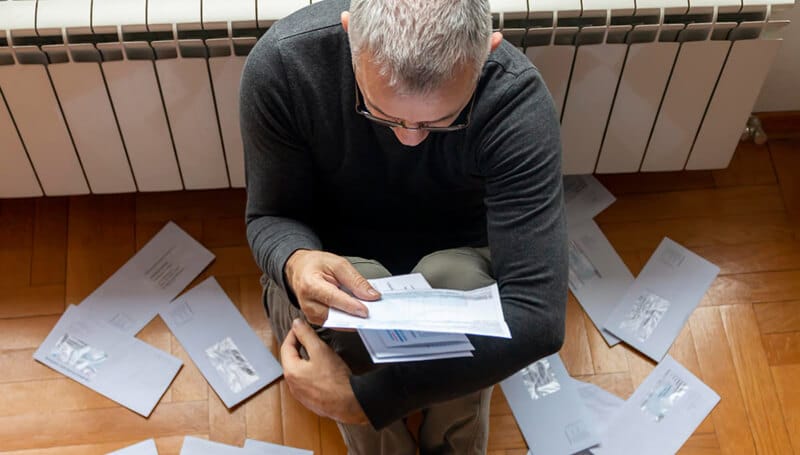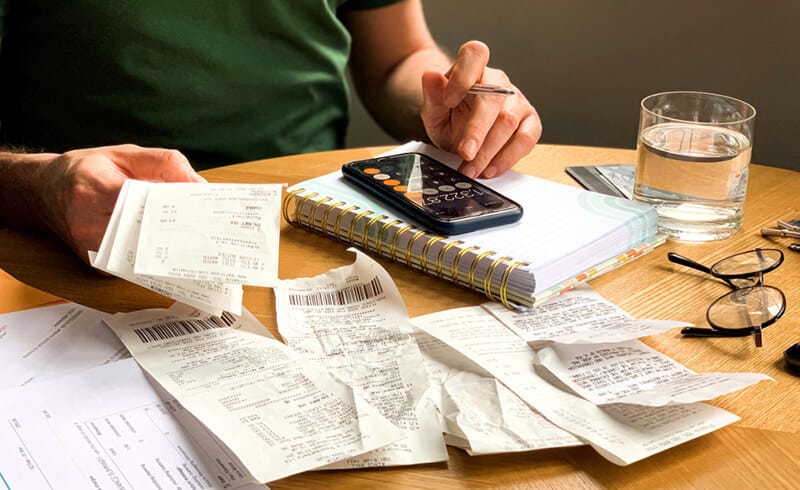What do you know about Australian laws regarding debt collectors? It doesn’t matter if you have any debts, if you are a debt collector, or even if a debt collector is just interested in someone you know. In all these cases you should know the information below.
Article topics:
- Why is a debt collector calling me?
- What can debt collectors do?
- What can debtors do?
- What to do if a creditor or collector doesn’t agree to a debt repayment agreement?
- What happens if the debtor cannot pay the debt?
- Ways debt collectors can contact you
- Rules for face-to-face visits
- Debt collectors use real estate database
- Do you have to pay debt collectors?
- What is the difference between debt collection and recovery?
- How often a debt collector can contact you
- What behavior would be considered illegal for a debt collector?
- How to deal with a debt collector
- What happens if you ignore debt collectors in Australia?
- How to complain about a debt collector
- Organizations where you can send a complaint against a debt collector
Who is a debt collector?
A debt collector is an individual responsible for recovering money owed on delinquent accounts. Debt collectors may work directly for an organization or debt collection agencies. Their primary role involves contacting individuals who owe money, communicating the amount owed, setting payment deadlines, and assisting in establishing payment plans to help resolve the debt.

Why is a Debt Collector Calling Me?
A debt collector may be trying to contact you for several reasons:
- Overdue Debt: A creditor believes you are past due on a debt. Creditors may employ their own debt collectors or refer or sell your debt to an outside collection agency.
- Locating Someone: A debt collector may be trying to locate someone you know. However, they are not permitted to disclose that the person owes any debt.
- Debt Buyer: A debt buyer has purchased the debt and is now attempting to collect it, either directly or through other debt collectors.
When a debt collector contacts you for payment, they must usually provide certain information during the initial communication or within five days of that communication.
What Can Debt Collectors Do?
Debt collectors have several methods to recover overdue debts, but their actions are regulated by specific laws and guidelines.
These laws cover:
- Contact Regulations: When and how debt collectors can contact a debtor.
- Dispute Handling: Procedures debt collectors must follow if the debtor disputes owing the debt.
- Information Provision: The obligation of debt collectors to provide necessary information and documents to the debtor.

What can debtors do?
If you fall behind on your loan payments or miss a bill, you will be contacted and asked to pay. They may reach out by phone, email, SMS or letter, and there might be threats of legal action if the debt remains unpaid.
Sometimes, an attorney representing a creditor or debt collector may contact you.
What to do:
- Verify the debt and the amount. Check your records or request documents to confirm.
- Keep a record of all communications regarding the debt, including the date, time, and the name of the person you spoke with.
- Check when you last made a payment. If it was more than 6 years ago, the debt might be too old to collect.
- Determine if the creditor or debt collector is part of an external dispute resolution (EDR) scheme. Refer to our fact sheet on financial complaints to AFCA. Most creditors and debt collectors are members of the Australian Financial Complaints Authority (AFCA). Verify their membership on the AFCA website or by calling 1800 931 678.
- For telecom-related debts, file a complaint with the Telecoms Ombudsman via their website or by calling 1800 062 058.
- For energy or water-related debts, file a complaint with the Energy and Water Ombudsman in NSW, VIC, QLD, TAS, WA, SA.
If the debtor has enough money, they can repay the debt in full. In this case, it’s advisable for the debtor to request written confirmation that the debt has been fully paid off and that they no longer owe anything.
Debt collectors often agree to settle the debt within a certain timeframe and may make arrangements for those struggling to pay. It is best to have these agreements in writing. If you cannot meet these agreements, be sure to contact the debt collector.

What to do if a creditor or collector doesn’t agree to a debt repayment agreement?
- Continue paying what you can afford, even if the creditor or debt collector claims it is insufficient.
- Consider filing a complaint. Most creditors and debt collectors are members of the AFCA, and you can file a complaint if they do not offer a reasonable repayment agreement.
- AFCA can help establish a fair debt settlement agreement if they find your offer reasonable.
- Sometimes, debt collectors might agree to a smaller lump sum payment to settle the debt. Each company has its own policies, considering factors such as the difference between the debtor’s offer and the actual debt, the age of the debt, and the debtor’s financial situation.
What happens if the debtor cannot pay the debt?
In Australia, creditors or collectors generally have 6 years to initiate legal proceedings to collect a debt (or 12 years if it is a deed or mortgage). If they act within this period and obtain a court judgment, they have another 12 years to enforce the judgment (this period may be extended in some cases). If the debtor’s circumstances change and they acquire income or property during this time, they may have to repay the debt plus interest and legal costs.
If a debtor cannot pay all of their debts, they might consider bankruptcy. When a debtor declares bankruptcy, a bankruptcy trustee takes control of their assets and finances. In return, the debtor is protected from lawsuits by creditors. The debtor will be released from many, but not necessarily all, of their debts.
A debtor can voluntarily declare bankruptcy or be forced into it. Bankruptcy indicates that a debtor cannot pay their debts as they come due, which is known as “insolvency.” There is no minimum debt amount required to declare bankruptcy voluntarily. However, if someone is forced into bankruptcy, the debt must exceed $10,000.
Ways Debt Collectors Can Contact You
Debt collectors can reach out to you in various ways, including by phone, letter, email, social media, or in person. However, they must always respect your privacy. By law, a debt collector cannot disclose their status or share information about your financial situation with anyone else without your permission.
- Choosing How to Be Contacted. You have the right to specify how a debt collector can contact you, such as requesting communication in writing only. You can also designate someone, like a financial counselor, solicitor, guardian, or carer, to handle communications on your behalf.
- Social Media and Email. Debt collectors cannot use email, social media, or similar technologies in ways that could compromise your privacy. They must ensure that any messages are seen only by you and not by others.
- Face-to-Face Visits. In-person visits by debt collectors should only occur if other contact methods have failed, if there is doubt about your identity or location, or to inspect secured property. Debt collectors should prioritize phone, letter, or email communication. If a face-to-face visit is necessary, they should adhere to the appropriate visiting hours and avoid visiting you at work unless absolutely necessary.
Rules for Face-to-Face Visits
If a debt collector visits you in person, they must:
- Leave immediately if you request it.
- Treat your family and any third parties with courtesy and respect.
- Respect your privacy around family members and third parties.
- Avoid lingering near your home or engaging in behavior that suggests surveillance.
- Not imply that any third party is liable for the debt if it is untrue.
- Not discuss the debt with your child (under 18) unless you permit it, or if the child is willing and able to act as a translator or intermediary.
- Avoid actions that could embarrass or distress you or any third party.

Debt collectors use real estate database
If someone buys or sells real property, then such a person leaves information about themselves in the relevant databases, and providing such information is part of the legal methods that debt collectors use to contact debtors or obtain more information about them. PrintForce is one of the services that provide such a database. So, if you are a debt collector or are interested in real estate data, you can get more information here.
Do you have to pay debt collectors?
In general, yes. If you don’t pay, the collection agency may sue you to collect the debt. If they win, the court can authorize them to garnish your wages or bank account or place a lien on your property. You can defend yourself in a debt collection lawsuit or file for bankruptcy to halt collection actions.
What is the difference between debt collection and recovery?
Debt collection is the process by which a business attempts to collect debts owed by its customers. Recovery, on the other hand, involves a third party attempting to collect money owed to another creditor or business.
How Often a Debt Collector Can Contact yo
Debt collectors must adhere to specific guidelines regarding the frequency and timing of contact with a debtor.
| Type of Contact | Days | Contact Should Be Limited To |
| Contact by Telephone | Monday to Friday | 7:30 am to 9 pm |
| Weekends | 9 am to 9 pm | |
| National Public Holidays | No contact recommended | |
| Maximum 3 phone calls a week or 10 a month | ||
| Face-to-Face Contact | Monday to Friday | 7:30 am to 9 pm |
| Weekends | 9 am to 9 pm | |
| National Public Holidays | No contact recommended | |
| All Workplace Contact | Debtor’s normal working hours if known, or 9 am to 5 pm on weekdays |
Debt collectors should not contact you more than three times in a week. If they do, it could be considered harassment. While debt collectors are allowed to contact your family and friends, they must not breach your privacy. Your family and friends are not obligated to provide any information or agree to contact you on behalf of the debt collector.

What behavior would be considered illegal for a debt collector?
Under Australian law, a debt collector must not:
- Use physical force
- Use coercion
- Unduly harass or hassle the debtor
- Mislead or deceive the debtor
- Take unfair advantage of any vulnerability, disability, or similar condition affecting a debtor, which can amount to unconscionable conduct.
These laws also apply when contacting anyone connected to a debtor, including a spouse, partner, or family member.
Report any assault or threats of violence to the police.
Debt collectors must protect the personal information of debtors and third parties. If a debt collector or creditor has breached privacy laws, contact the Office of the Australian Information Commissioner.
How to Deal with a Debt Collector
If a debt collector contacts you, it’s important to:
- Be honest about your financial situation, including other debts.
- Respond promptly to calls or letters.
- Agree to a payment plan if you can afford it.
- Inform the debt collector if your contact details change.
Maintain a record of all communications with the debt collector. Include:
- Date and time of contact
- Name of the debt collector and their company
- Method of contact (in person, by phone, letter, email, or text)
- Details of the conversation
What Happens if You Ignore Debt Collectors in Australia?
If you ignore debt collectors and take no action, a judgment may be entered against you. This could allow the creditor to enforce the judgment by repossessing your goods to sell and recover the owed money.

How to Complain About a Debt Collector
If you are being harassed or intimidated by a debt collector, write a formal complaint to the debt collector. If this does not resolve the issue, escalate your complaint to the relevant external dispute resolution scheme (see the list below).
Sample Email to Complain About Harassment
To: <email address> Subject: Complaint about Debt Collection Practices by (Name of Collector/Creditor)
Dear Sir/Madam,
I wish to lodge a complaint regarding the debt collection practices of (name of creditor or debt collector).
Example 1: A representative (name) of your business has been calling me excessively. Over the past four weeks, I have received over 30 phone calls, some of which occurred after 9 PM.
Example 2: A representative (name) of your business called my workplace (name of workplace) and discussed my debt with a coworker. Your representative asked for personal details about me, including my home address and phone number.
Example 3: On (date), a representative (name) of your business informed me that I owed a debt and threatened to seize my possessions if I did not pay immediately. I dispute owing the debt, and there is no court judgment against me that would allow for the seizure of my possessions.
Example 4: On (date), a representative (name) of your business insisted that I take out a loan to make a lump-sum payment on my debt. This violates the Australian Consumer and Competition Commission and the Australian Securities and Investments Commission’s Debt Collection Guidelines.
I request that this harassment cease immediately. If this behavior continues, I reserve the right to take further action, including filing a formal complaint with ASIC and the ACCC and/or an external dispute resolution scheme. I request that all future correspondence regarding this matter be in writing.
Yours sincerely,
(Full name)
Organizations where you can send a complaint against a debt collector
| Sector | EDR Scheme | Phone | Website |
| Financial services | Australian Financial Complaints Authority (AFCA) | 1300 565 562 | afca.org.au |
| Utilities | Telecommunications Industry Ombudsman Limited | 1800 062 058 | tio.com.au |
| Energy and Water Ombudsman Western Australia | 1800 754 004 | energyandwater.ombudsman.wa.gov.au | |
| Energy and Water Ombudsman NSW | 1800 246 545 | ewon.com.au | |
| Energy and Water Ombudsman Victoria | 1800 500 509 | ewov.com.au | |
| Energy and Water Ombudsman Queensland | 1800 662 837 | ewoq.com.au | |
| Ombudsman for the Northern Territory | 1800 806 380 | ombudsman.nt.gov.au | |
| Energy and Water Ombudsman South Australia | 1800 665 565 | ewosa.com.au | |
| Energy Ombudsman Tasmania | 1800 001 170 | energyombudsman.tas.gov.au | |
| Ombudsman Tasmania (for water) | 1800 001 170 | ombudsman.tas.gov.au | |
| ACT Civil and Administrative Tribunal | 02 6207 1740 | acat.act.gov.au |



'How to avoid debt collectors in Australia ' have no comments
Be the first to comment this post!